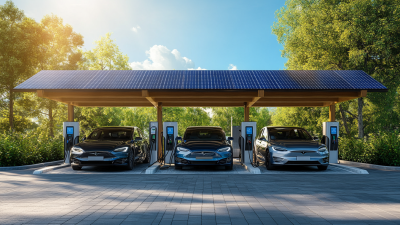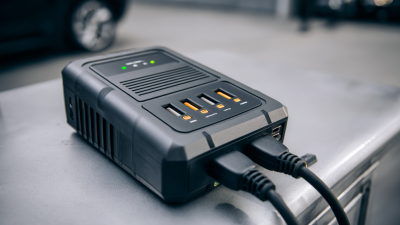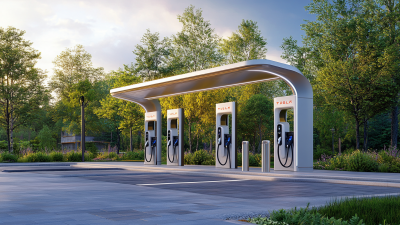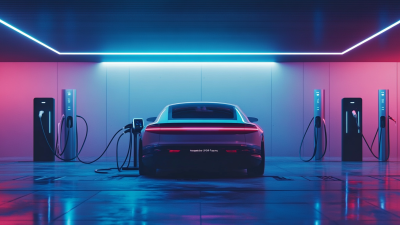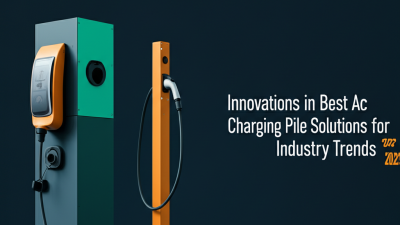In today's evolving landscape of electric vehicles (EVs), businesses are increasingly recognizing the importance of incorporating EV chargers for business within their operations. Choosing the right type of charger is not just a logistical task but a strategic decision that can influence customer satisfaction, operational efficiency, and overall sustainability goals. Whether you're looking to enhance your company’s image by promoting green energy or you aim to meet the rising demand from eco-conscious consumers, selecting the best EV chargers for business needs is crucial. However, navigating the myriad of options available can present several problems, from technical specifications to installation costs. In this ultimate guide, we will explore the common challenges businesses face when selecting EV chargers, helping you make informed decisions that align with your unique requirements and contribute to a greener future.

When selecting the best electric vehicle (EV) chargers for your business, it's essential to understand the different types of chargers available and their specific applications. There are primarily three categories: Level 1, Level 2, and DC fast chargers. Level 1 chargers are suitable for locations with limited power supply and are often used in residential settings. In contrast, Level 2 chargers are faster and more efficient, making them ideal for workplaces and commercial areas. They can provide a significant charge in a few hours, which is beneficial for businesses with a steady flow of EVs.
For businesses that need quick turnaround times, DC fast chargers are the solution. These chargers can provide an 80% charge in about 30 minutes, catering to high-demand scenarios such as highway rest stops or high-traffic urban areas. As the electric vehicle market continues to grow and the infrastructure rapidly evolves, companies must also consider the implementation challenges and explore evolving solutions that can support their specific needs. Understanding the available charging options can lead to better service offerings and contribute to a more sustainable future for transportation.
| Charger Type | Charging Speed | Ideal Use Case | Installation Type | Cost Range |
|---|---|---|---|---|
| Level 1 Charger | 4-5 mph | Home Use, Small Businesses | Plug-in | $300 - $600 |
| Level 2 Charger | 10-25 mph | Commercial, Fleet Operations | Plug-in, Wall-mounted | $500 - $1,500 |
| DC Fast Charger | 60-80 mph | High Traffic Areas, Quick Stops | Standalone Station | $10,000 - $40,000 |
| Wireless Charger | Varies | Future Use, Innovative Solutions | Embedded in Parking | $3,000 - $10,000 |
When selecting the best EV chargers for your business, understanding the differences in charging speed is crucial. Level 1 chargers, often standard household outlets, provide a mere 2 to 5 miles of range per hour of charging. While they are the most accessible and affordable option, their slow pace makes them suitable primarily for businesses with minimal charging demands or where vehicles are parked for extended periods. For instance, a small business that primarily uses electric vehicles for short trips might find Level 1 chargers adequate during overnight parking.

On the other hand, Level 2 chargers significantly boost charging speed, offering 10 to 60 miles of range per hour, depending on the vehicle and charger output. These units are ideal for businesses that see higher vehicle turnover, such as retail locations or service stations. Furthermore, DC Fast Charging takes it a step further, providing 60 to 100 miles of range in just 20 minutes or so. This option is particularly beneficial for businesses in high-traffic areas, enabling quick turnarounds for fleet vehicles, thus enhancing operational efficiency. Choosing the right charging solution depends on your specific business needs, vehicle usage, and customer expectations.
When selecting commercial EV charging solutions, it’s crucial to focus on key features that align with your business needs. First, consider the charging speed; Level 2 chargers typically deliver 10 to 20 miles of range per hour, making them suitable for businesses that need to provide services without long downtimes. According to a market report by Bloomberg New Energy Finance, the demand for fast chargers (DCFC) is set to increase dramatically, with projections indicating that over 40% of all new EV registrations will require DCFC by 2030. These faster options are ideal for high-traffic locations, enabling quicker turnaround times for vehicles.
Another critical aspect is the integration capabilities of the charger with existing infrastructure. Many modern EV chargers offer smart features, including demand response, which helps reduce peak energy loads. Data from the U.S. Department of Energy suggests that businesses equipped with smart charging solutions can lower their energy costs by 20% to 40%, highlighting the importance of selecting technology that supports future scalability and efficiency. Additionally, user-friendly interfaces and robust payment systems can enhance customer experience and streamline operations, making businesses more appealing to EV drivers.
When considering the initial investment for EV chargers, businesses must weigh the costs against the long-term benefits. The upfront expense can vary significantly depending on the type of chargers chosen and installation requirements. Basic Level 2 chargers may offer a lower initial cost, while DC fast chargers provide quicker charging times but come with a higher price tag. It’s essential to assess your business's charging needs and projected usage before making a decision.
One tip is to explore available incentives and rebates that can offset initial costs. Many governments and utility companies offer financial support for businesses that invest in EV infrastructure, which can alleviate some of the financial burden. Additionally, consider the potential savings on fuel costs and the positive impact on your company's image by promoting sustainability.
Another crucial factor to consider is the return on investment (ROI). While the initial outlay may seem daunting, the long-term benefits—including increased customer attraction, enhanced employee satisfaction, and potentially lower operating costs—can significantly outweigh the initial expenditure. Businesses that stay ahead of the EV trend can also position themselves as leaders in sustainability, attracting eco-conscious customers.
This chart illustrates the initial investment cost vs. long-term benefits of installing EV chargers in a business setting. The data presents a hypothetical comparison based on common scenarios businesses might encounter.
When integrating EV chargers into your business, several key considerations can ensure a smooth installation and optimal performance. First, evaluate your existing electrical infrastructure to determine the capacity for additional load.
 Collaborating with a qualified electrician will help you identify any necessary upgrades to accommodate the chargers. It's essential to select locations that maximize visibility and accessibility for users, ensuring that your charging stations are easy to find and use.
Collaborating with a qualified electrician will help you identify any necessary upgrades to accommodate the chargers. It's essential to select locations that maximize visibility and accessibility for users, ensuring that your charging stations are easy to find and use.
Additionally, consider the type of chargers that best align with your business needs.
Level 2 chargers offer a balance between charging speed and cost, making them suitable for most commercial settings. However, for businesses looking to provide rapid charging solutions, investing in DC fast chargers can enhance customer satisfaction and turnover rates. Furthermore, integrating EV chargers with your business management software can streamline operations, allowing for efficient tracking of usage and maintenance, and offering valuable insights into customer behavior. By paying attention to these integration aspects, you can create a charging infrastructure that not only benefits your customers but also supports your business goals.
